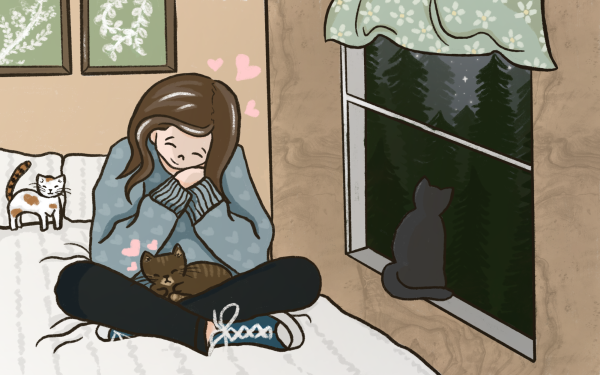the pursuit of happiness begins with self-love
The phrase, “Be the best version of yourself” sounds good in theory, but it is nonsense. This phrase merely simplifies the concept of self-improvement with a pleasing ring to it. When it comes to self-improvement, we often want to attain a version of ourselves that is perfect. The truth is, this desired version of ourselves is often unattainable and unrealistic. In reality, you cannot be the best version of yourself at all times. There will be days when life feels out of control, and there will also be days when everything falls into place. We cannot discard the undesirable versions of ourselves; We can only live authentically and accept ourselves even in our worst moments.

Angie Ilg, a Cleveland-based life coach, provided insight on this topic. Ilg works with sensitive people to enjoy life without feeling overwhelmed and anxious.
“If you are trying to look for the best version of yourself, you are automatically going into judgment mode,” Ilg said.
This mindset is not beneficial because it trains the brain to point out your flaws to “fix’’ them. Constant judging is not healthy, but a self-deprecating behavior. This will only deteriorate your emotional well-being, as there is a war within your mind as you struggle to be the “best.” Instead, here are five ways to pursue happiness without having to be perfect all the time.
Step One: The Brain Battle
Ilg believes that to live more authentically, we need to understand the difference between our minds and ourselves as a whole. It is important to remember that we cannot let our minds control our entire being. Ilg said that individuals tend to get stuck in their heads, thus becoming out of touch with reality. To combat this, we can create a division between ourselves and the negative self-talk that occurs in the brain. The thoughts that arise in our brains are entirely separate from our being.
“Our mind is the thing that creates suffering,” Ilg said. “If we understand the difference, then we can bring compassion and acceptance to ourselves.”
Ilg also mentioned something called the negativity bias, which according to Kendra Cherry at VeryWellMind is, “Our tendency not only to register negative stimuli more readily but also to dwell on these events.” Simply put, our brains are wired to focus on the bad stuff and stay focused on it. This is mainly an evolutionary response, as paying attention to danger was a survival skill. “Those who were more attuned to danger and who paid more attention to the bad things around them were more likely to survive,” Cherry writes. This phenomenon is why it is so difficult to stop focusing on the negatives, so stopping negative self-talk will be a continuous battle. However, by understanding our mind is separate from ourselves, we can be more in tune with our body and the world around us.

Step Two: Take Control of Your Thoughts
Now that we understand that our mind is separate from ourselves, a way to cope with negative self-talk, according to Ilg, is not to stop these thoughts, but to expect them.
“We don’t have to get rid of negative thoughts because our brain will give them until the end of time,” Ilg said.
She says not to give these thoughts any energy, as they are merely just thoughts. They will have no meaning if we do not give them meaning, rather accept them for what they are, and move on.
When it comes to worrying about self-image, Ilg mentioned that individuals can receive so much freedom and joy in their lives the less they care about what other people think. She continued, “What other people think of me is none of my business,” and “Nothing is personal.” These two mantras help to put things into perspective. Does it matter what other people think of you? It is more important to love yourself and not base your worth on what other people think. We should not be surrounding ourselves with people who think negatively about us, anyway. The second mantra puts us in control. If we let other people’s judgments define our self-worth, we take that personally and in situations such as those, we lose. However, by not taking stock of what others think, we can successfully avoid taking it personally, and that is a win in my book.

Step 3: Surround yourself with love and respect
In the pursuit of happiness, there is absolutely no room for toxicity. How can happiness thrive when toxicity looms overhead like a storm cloud? The answer is the two concepts cannot co-exist.
Everything cycles back to self-love: “When you start to love yourself you will naturally start to set boundaries,” Ilg said.
To set these boundaries, ask how to be more loving towards yourself. Self-love comes in different forms for different people. Whether it be journaling what you are grateful for, meditating or celebrating the small victories, baby steps towards self-love will end in a positive outcome. Once self-love is achieved, you will not want to surround yourself with toxic people. Over time, boundaries will form to guard against these unhealthy relationships.
It is so important to love ourselves because you cannot have respectful and loving relationships if you don’t. This idea is so prevalent amongst college-aged youth and is something that many people in our generation struggle with. At this young age, many of us lack the self-awareness to realize when relationships turn sour. It is integral to our well-being to recognize toxic relationships, but sometimes we just have to work on ourselves first so we can create boundaries.

Step 4: Let go of the desire to be perfect
Perfection is unattainable. Get that through your head.
Ilg describes perfection like this: If you try to hold a beach ball underwater, you will waste so much time and energy keeping it below the surface, but once you let go you will experience relief. Thus, aiming for perfection will only result in strain, as it is impossible.
Another way to let go of the desire to be perfect is to define success in your own terms, according to Ilg. She says to congratulate yourself on the small victories, too. If you do something you intend to do, consider it a success, no matter the outcome. It can be as simple as doing half of your laundry, even if you intended to do it all. The effort was put in, so it should be considered a victory. Thinking in this manner alleviates the pressure we put on ourselves to be perfect, and instead, we congratulate ourselves for trying.
Ilg incorporates this into her own life by making a “Ta-Da” list instead of a “To-Do” list. Instead of having a list of things she needs to do, she makes a list of things that she has done. This retrains the brain into considering the tasks we do well and allows us to celebrate the small victories.
Step 5: Find things you are passionate about
Passion is something that keeps us going. Passion builds purpose, and purpose provides motivation. By engaging in activities that we are passionate about, “we are staying true to ourselves,” Ilg mentions.
Passion can be found in unlikely places, so it is important to try new things to see if they are enjoyable to you. I feel the most passion when I am writing because it feels like something I am meant to do. I think a good indicator of passion is the feeling of resonance. Is this activity important to you? Does it make you happy? Is it something that you feel you are meant to do?
Ilg said that if we engage in activities we are passionate about, “we are doing what our souls want us to do.” These activities provide meaning, so focus your time and energy on passion-based activities, not someone’s judgments of you or the negative thoughts that run through your head.
If you haven’t noticed already, all of these steps are not only ways to achieve a happier life but are simply ways to practice self-love.
-
We can practice self-love by recognizing that our mind does not control us and by staying in tune with our bodies.
-
We can practice self-love by taking control of our negative self-talk, not letting those thoughts have meaning and not caring what others think. Love yourself, and do not let others’ perceptions of you rule your life.
-
We can practice self-love by surrounding ourselves with respectful and loving people. Yes, setting boundaries to avoid toxic people takes self-love, but the continuation of those boundaries is an act of self-love in itself.
-
We can practice self-love by celebrating our little victories. Being proud of all levels of success is so healthy!
-
We can practice self-love by finding things we are passionate about. Staying true to yourself by doing the things you love is self-loving.
Self-love looks different for different people, so do something that makes you feel good about yourself. Try going to a coffee shop to journal, meditate, buy yourself flowers and stop caring what others think. “The best version of yourself” is right in front of you, so stop trying to achieve perfection and practice self-love instead.
Support Student Media
Hi! I’m Catie Pusateri, A Magazine’s editor-in-chief. My staff and I are committed to bringing you the most important and entertaining news from the realms of fashion, beauty and culture. We are full-time students and hard-working journalists. While we get support from the student media fee and earned revenue such as advertising, both of those continue to decline. Your generous gift of any amount will help enhance our student experience as we grow into working professionals. Please go here to donate to A Magazine.









